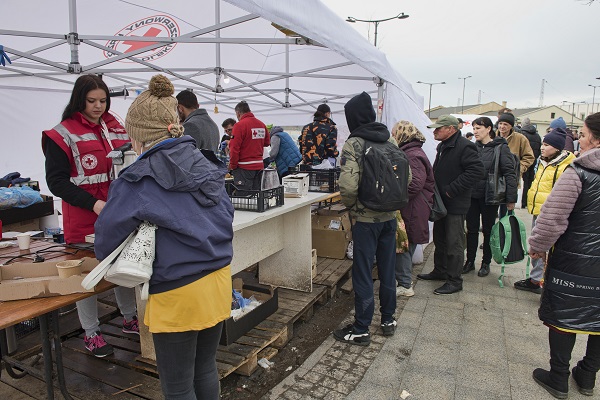 Luc Scheer, member of the Luxembourg Red Cross management board;
Credit: Croix-Rouge luxembourgeoise
Luc Scheer, member of the Luxembourg Red Cross management board;
Credit: Croix-Rouge luxembourgeoise
Earlier this week, Luxembourg’s Minister of Foreign and European Affairs, Jean Asselborn, confirmed that more than 4,600 Ukrainian refugees had already arrived in the Grand Duchy since the Russian invasion of Ukraine on 24 February 2022.
In light of this not insignificant number of arrivals in Luxembourg and reports of delayed procedures concerning the hosting of Ukrainian refugees in private homes, Chronicle.lu reached out to the Luxembourg Red Cross (Croix-Rouge luxembourgeoise) and Caritas Luxembourg, which, with the support of the Ministry of Family Affairs, Integration and the Greater Region, are in charge of the procedure of pairing Ukrainian refugees with host families in the Grand Duchy, for information regarding this procedure.
Speaking on behalf of both organisations, Luc Scheer, a member of the management board of the Luxembourg Red Cross, clarified that: "Thanks to the great solidarity of the Luxembourg population, Croix-Rouge luxembourgeoise and Caritas have so far been able to arrange private accommodation for 153 people having fled the conflict in Ukraine staying in Luxembourg". He added that these individuals have either already moved in or are about to move in "with host families or into houses and apartments made available at no charge".
The Luxembourg Red Cross and Caritas Luxembourg "expect this number to grow at a faster rate in the weeks to come as the number of people living in temporary structures and obtaining the [temporary] protection status increases". Mr Scheer explained that they have prepared for this eventuality by "assessing available offers ahead of incoming demand without so far treating all offers received". He added that they had also observed "a developing demand for relocation from both host families and refugees who matched spontaneously in the past weeks and who encounter difficulties in cohabitation".
When asked to confirm reports that host families offering a place to stay for longer periods of time, i.e. six months or more, were currently being prioritised, Luc Scheer explained that this was not quite the case. "We ask for a minimum of three months from host families to be able to offer stability to the refugees", he elaborated. "For empty apartments or houses that are being made available, we aim for six months".
Regarding the criteria being considered in the approval of host families, Mr Scheer noted: "It's a matching process taking into account the material as well as the social needs and possibilities of both parties. We aim at ensuring decent material conditions and also the basis of a safe and successful cohabitation".
Currently, this procedure is being carried out by both staff and volunteers across various departments and teams. In the context of the Russia-Ukraine war and subsequent refugee influx, the Luxembourg Red Cross has opened 80 additional positions. Most of these are temporary contracts for additional staff to ramp up social and psycho-social support in the refugee shelters and additional educators to strengthen the teams in "Maison Relais" (childcare centres) run by the non-profit humanitarian organisation across the country, as well as a new team of multilingual professionals in the educational field to work with children staying in the refugee shelters. Caritas Luxembourg has also begun recruiting additional staff in this context.
At present, the Luxembourg Red Cross, which has long relied on the support of volunteers, is specifically looking for additional volunteers who speak Ukrainian and / or Russian.
The Luxembourg Red Cross and Caritas Luxembourg are currently working closely together to implement this procedure as well as to provide social and psycho-social support to Ukrainian refugees staying in shelters such as the SHUK emergency accommodation structure in Luxembourg-Kirchberg.

Caption: People fleeing the conflict in Ukraine often arrive by train in Lviv, near the country's western border with Poland, en route to other European countries. Many have been travelling for a long time and are tired and hungry. The Ukrainian Red Cross Society has established a food kitchen in a tent outside the train station where these people can avail of hot food and drinks before continuing on their journeys. Credit: © IFRC / Victor Lacken









